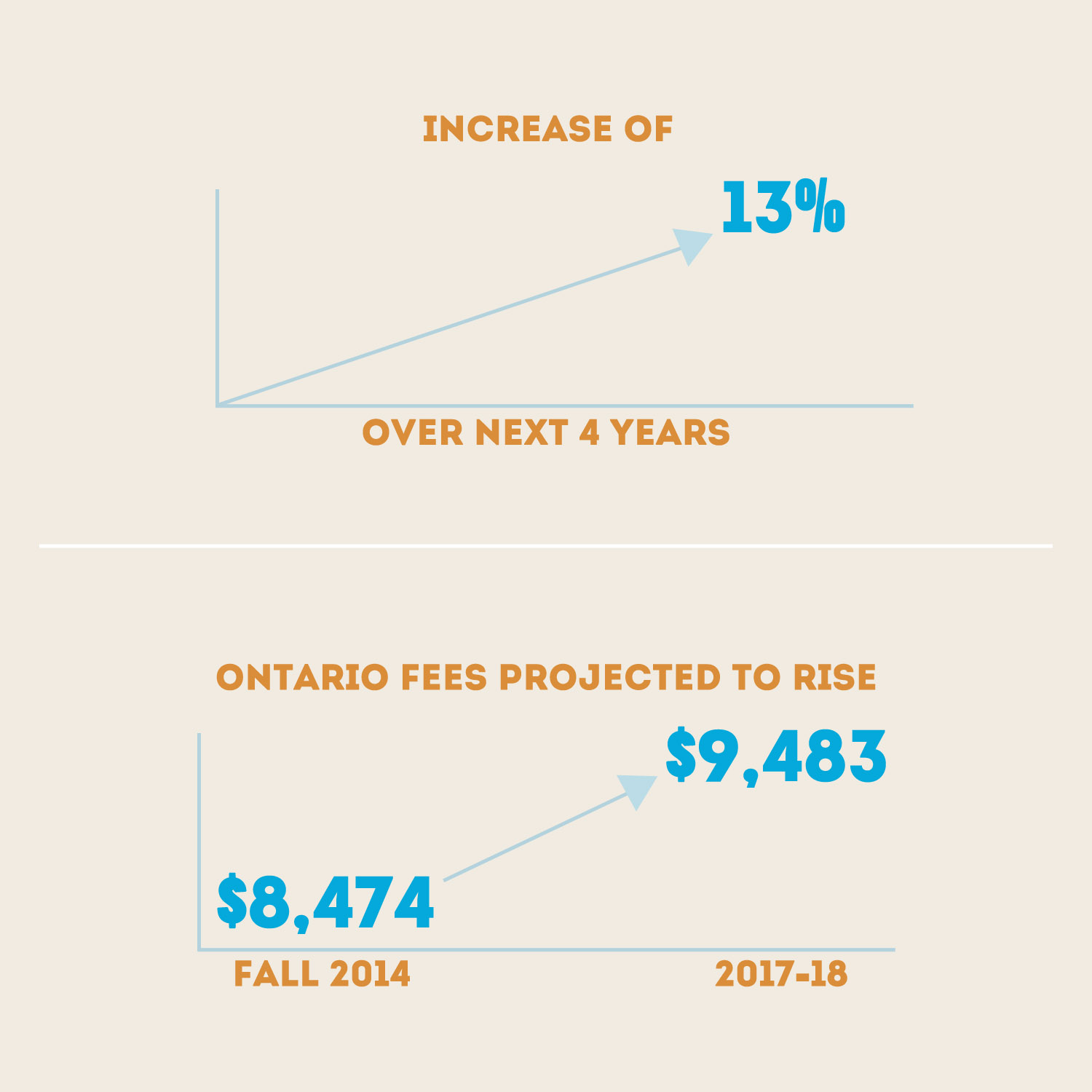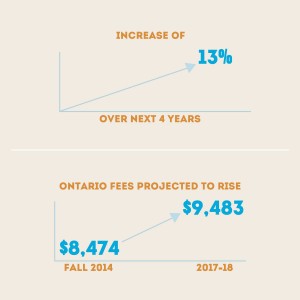Debt a growing concern

Projected tuition rise will result in long-term effects

In September, the Canadian Centre for Policy Alternatives released a study which looked at the increasing tuition fees at universities across the country. The study, entitled “Tier for Two: Managing the Optics of Provincial Tuition Fee Policies,” projected that tuition and other compulsory fees will increase by 13 per cent over the next four years.
Ontario is at the high end of this, with fees in 2017-18 estimated to reach $9,483.
Their conclusions were based on current trends in annual increases of tuition and compulsory fees as well as government policies in each of the provinces. The reason why the numbers are worse for Ontario is because of the inverse trends of public funding and tuition.
“A lot of it is driven by the fact that public funding, so government funding both federally and provincially, has declined,” Erika Shaker, director of CCPA education project, explained. “Correspondingly, the amount of university operating revenue that comes from tuition fees has increased over that same period.”
CCPA also looked at the financial aid available to students in each province. In Ontario, this includes the 30 per cent off tuition grant. Despite this, Ontario is projected to be the seventh-highest province for the cost of learning for median families in 2017-18.
This is according to the “Cost of Learning Index” section of the study, which looks at tuition, compulsory fees and bursary programs in a province and compares this to the earnings of a median family with children. Its measurements are based on how these tuition and ancillary fees are rising in comparison to how the median incomes of families are rising.
But according to Shaker, it shouldn’t matter that Ontario isn’t as bad off as other provinces in terms of the index.
“If the issue is affordability and public accountability and ensuring that students actually can go on to pursue post-secondary education and not come out with a wack of debt at the end or have to be concerned throughout their entire high school career, whether they’ll actually be able to afford going to university and deal with the fact that they will be taking on a significant level of debt, then we really need to evaluate our priorities,” said Shaker.
Both Shaker and Sean Madden, executive director of the Ontario Undergraduate Student Alliance, noted the long-term problems that go along with the government putting the financial onus on students and families to pay for post-secondary education.
“When you’re graduating students with a significant amount of debt, there are public ramifications to that too in the form of lost productivity and the fact that we know that students who graduate with high levels of student debt are much less able, they’re postponing major life decisions, they’re likely to have more debt for longer, they’re likely to have less savings,” Shaker said.
When they heard the projection from the study, Madden said OUSA was disappointed.
“During the election we called for the government to freeze tuition for at least a period of one year and then look to continue to regulate it but lower the amount it can go up,” he said. “We’re going to keep asking for that.”
Ontario is currently operating under a tuition framework that limits universities to only increasing tuition by three per cent until 2016-17. As this will come to an end around the same time that the provincial government is aiming to have eliminated their deficit, they’ll be able to commit to a freeze.
“We’ll be working with all of the new MPPs and all of the old MPPs to let them know that the cost of tuition has risen so much faster than people’s ability to pay,” Madden said.
What they’re mainly concerned with is the fact that if the government cannot keep tuition down they also can’t increase student assistance.
“We’re really concerned that people are going to have to turn to alternative sources for loans and increasing their debt.”
Madden encouraged students to contact their MPPs to express these issues.
“Everybody hears these numbers every year and I think … people are starting to drown it out,” he said. “But it’s really hard for MPPs to ignore students and their families coming up to them over and over again and saying ‘this is giving us a hard time.’ ”


